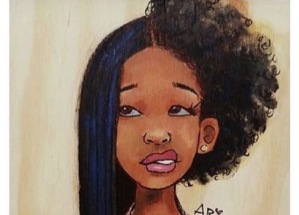
The erasure of kinky hair is a real issue, and I’ve been speaking on it since I started this blog and big chopped over four years ago. One glaring and utterly disturbing thing I noticed after becoming natural was black natural haired women’s obsession with having curly hair and all the bloggers, vloggers, and hair products that promote this trend. I didn’t understand it then, and I don’t understand it now. For many African American women, being natural isn’t pretty unless your hair is curly. I’m talking about those who aren’t happy with a simple twist out or braid out; they want that curly hair on a constant basis from using one or a bunch of products that will magically make their hair curl. What they fail to realize is that for many, despite the products they use, their hair still may not curl up the way they want it to – especially if they have kinky hair. I’ve even heard women say that they stopped being natural because their hair wouldn’t curl like the other naturally curly women (mixed race women or the bloggers who have 3b – 4a type hair). I’ve also heard women say that they refuse to go natural because they know their hair won’t curl up. All of these sentiments sadden me.
I always thought that the natural hair movement was about encouraging black women to embrace their hair as it grows out of their scalp and to learn to nourish it, take care of it and most importantly, love it. At least that’s what it means to me. But the constant barrage of images of women with curly hair due to their mixed heritage or whose hair type is simply naturally curlier than those with kinky hair has many black women seeking something that may never happen for them unless they become product junkies and buy a bunch of products. This, in turn, does not allow them to love and appreciate their hair for what it does naturally on its own and accept their hair for what it cannot do. In turn, they give up on their natural hair journey because of disappointment and unrealistic expectations.
I have nothing against curly girls. I love and appreciate them. But we cannot ignore the fact that there is still a lack of representation for those who have kinky hair. I place the bulk of the blame on the companies who market false hopes and misguided ideas of beauty to women with kinky hair that they too can have instant curly hair by using a cream, gel or shampoo. Curly hair is not what makes natural hair beautiful. Being natural and no longer poisoning your hair, scalp, and essentially your body with chemical relaxers is what is beautiful. Caring for your hair with all natural oils and products is what is beautiful.
Making the decision to rock your natural hair is not something you should take lightly. It’s an emotional journey, it’s time-consuming, and it’s full of highs and lows. Sticking to that decision when experiencing the frustrating lows is even harder. But one of the worst things you can do is to go into your natural hair journey with unrealistic expectations. If you’re a kinky haired girl, learn to love your kinks and coils and don’t be ashamed to rock them. It is completely okay if your hair doesn’t curl up magically after putting a curling pudding on it. Don’t allow our kinky hair to be erased because society and hair care lines are catering to and promoting curly hair every time you go to the store, or look at a magazine or watch a TV commercial. Kinky hair is beautiful. Kinky hair needs representation. We are not the stepchild of the natural hair community. We will not be erased.
